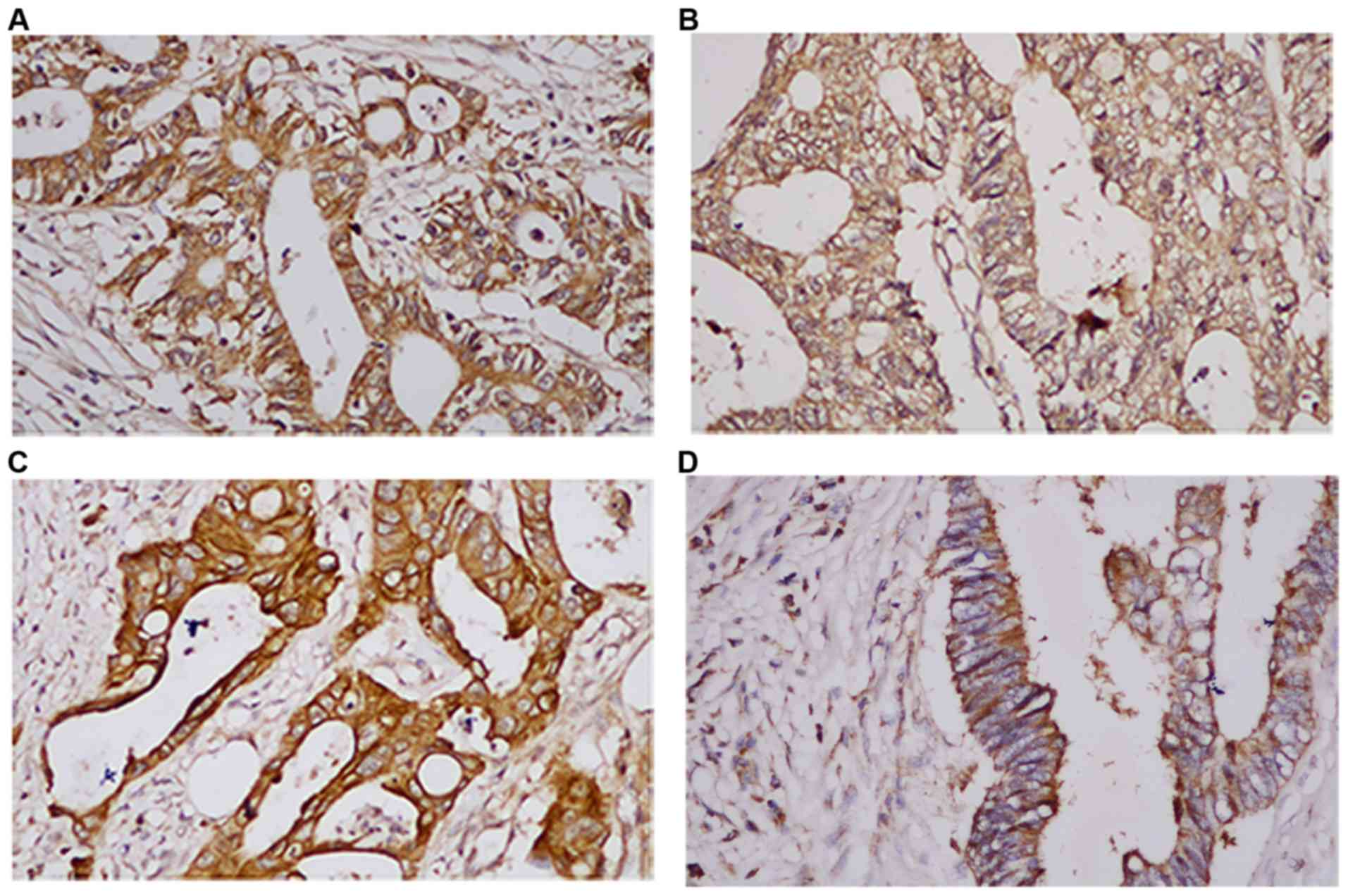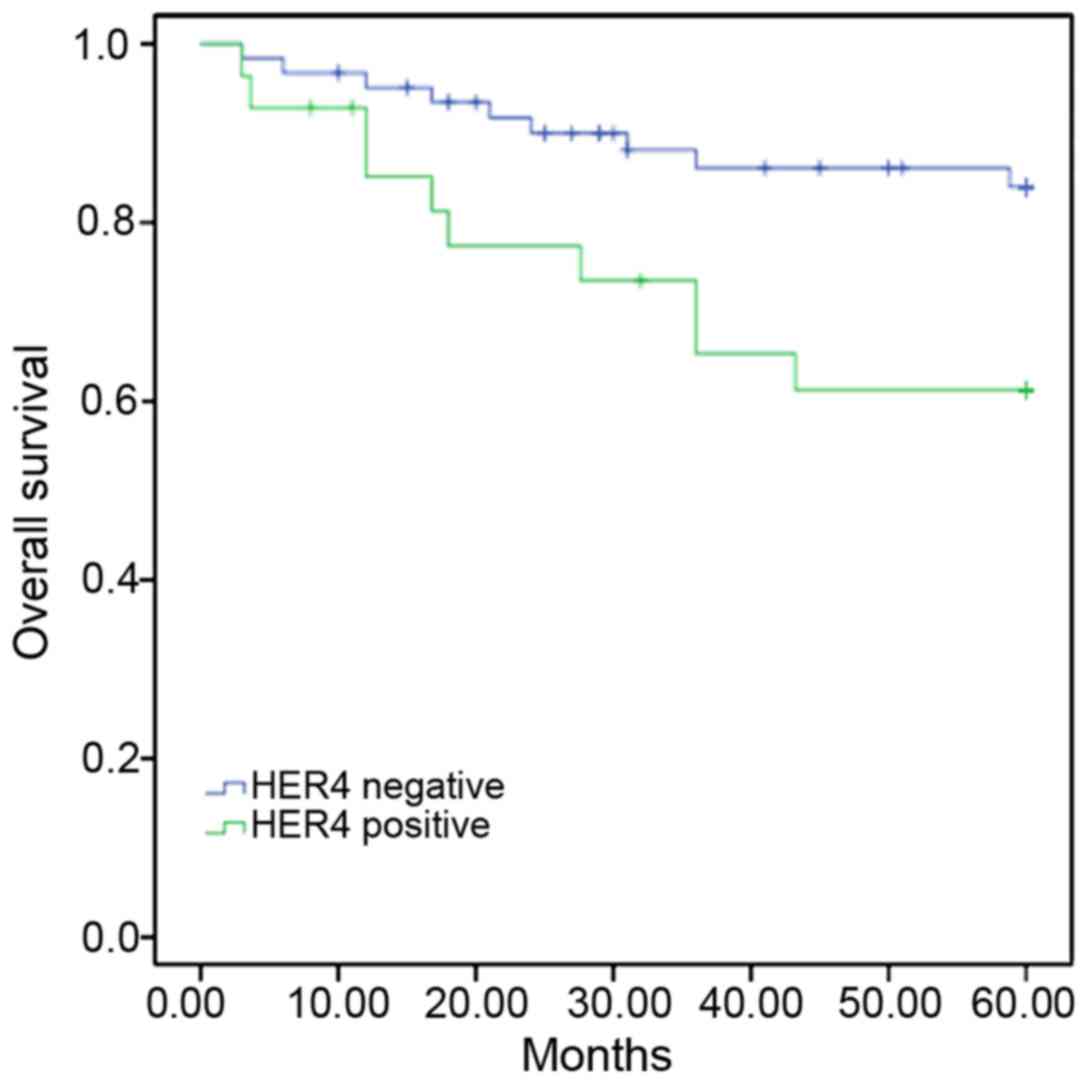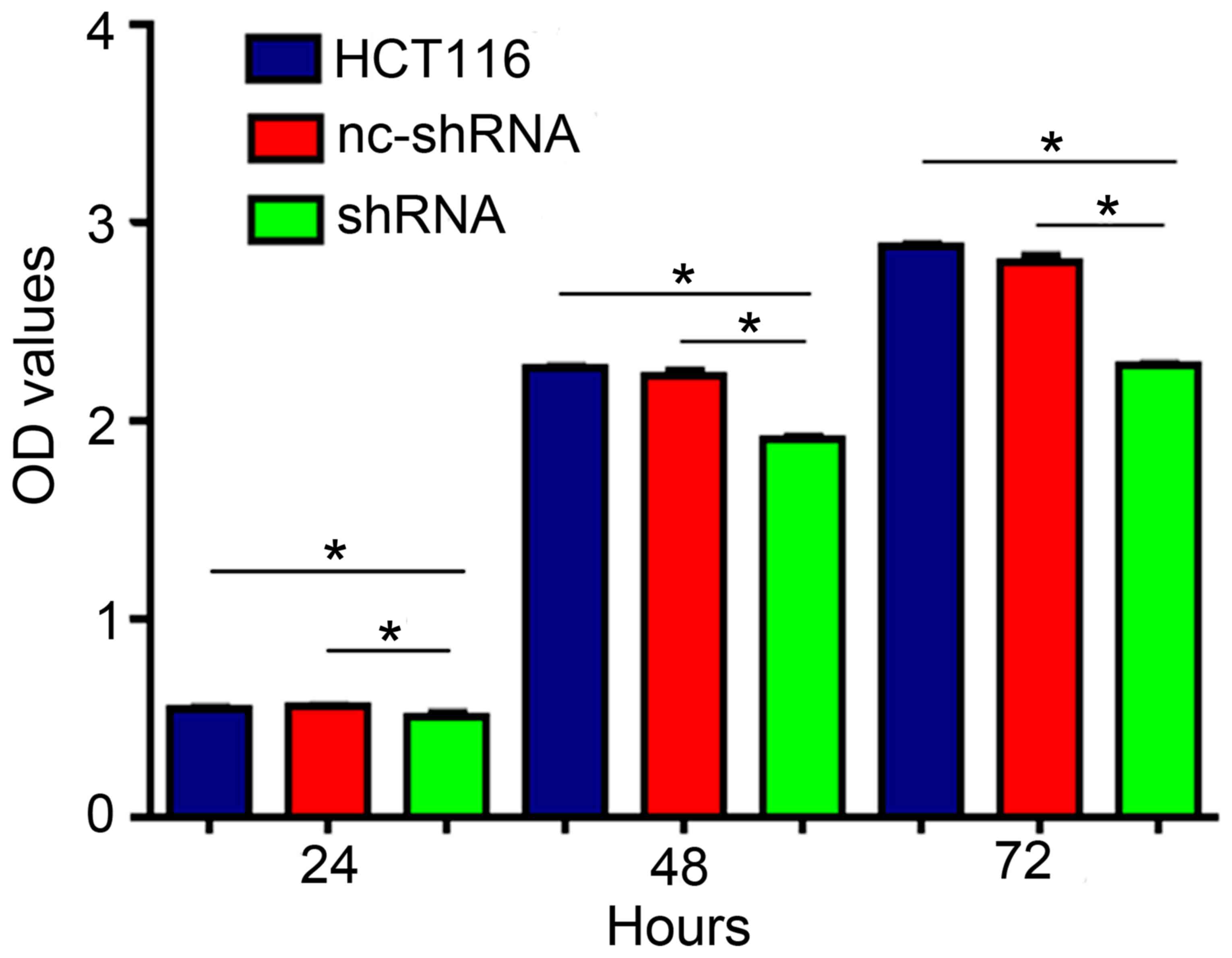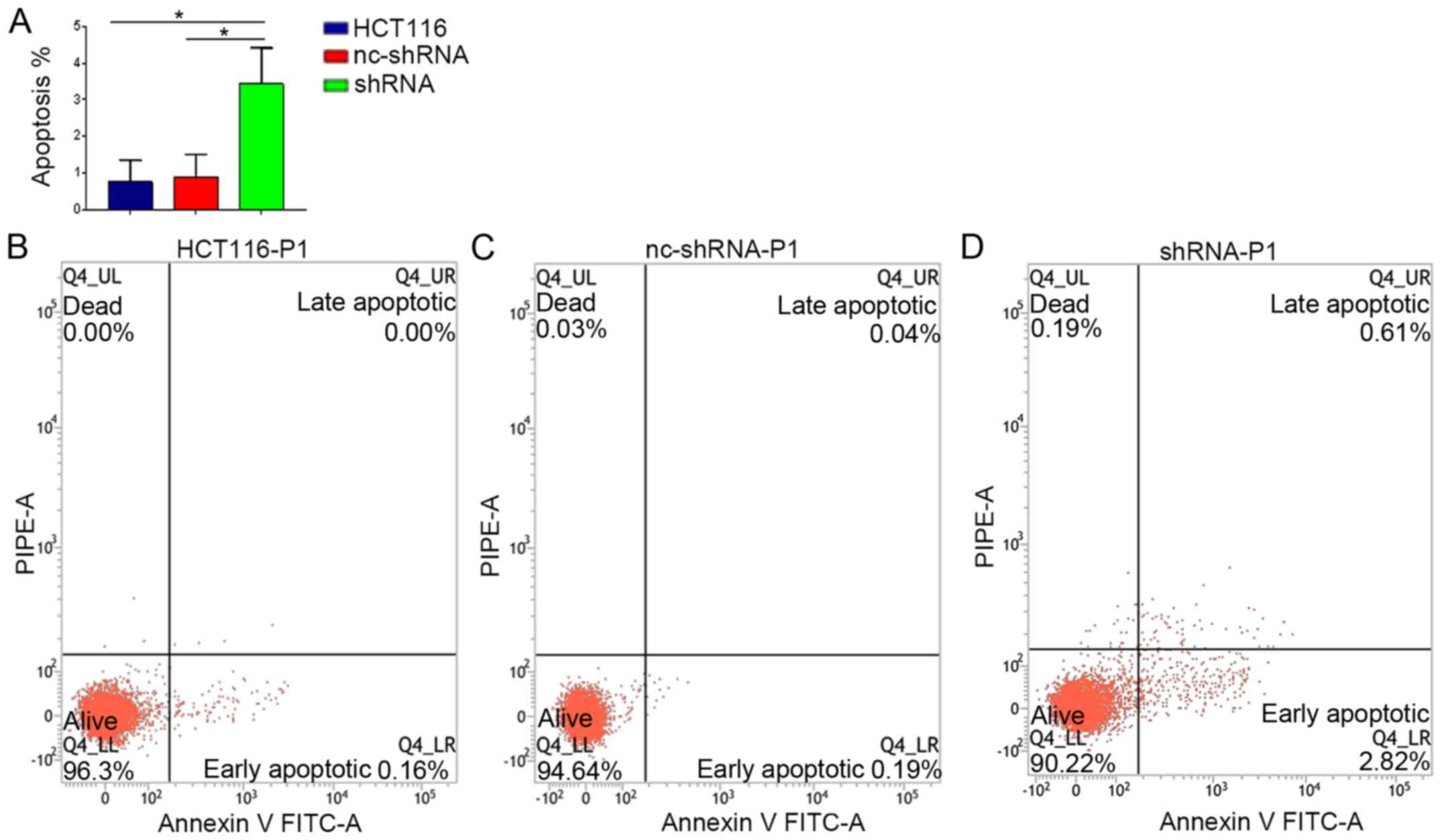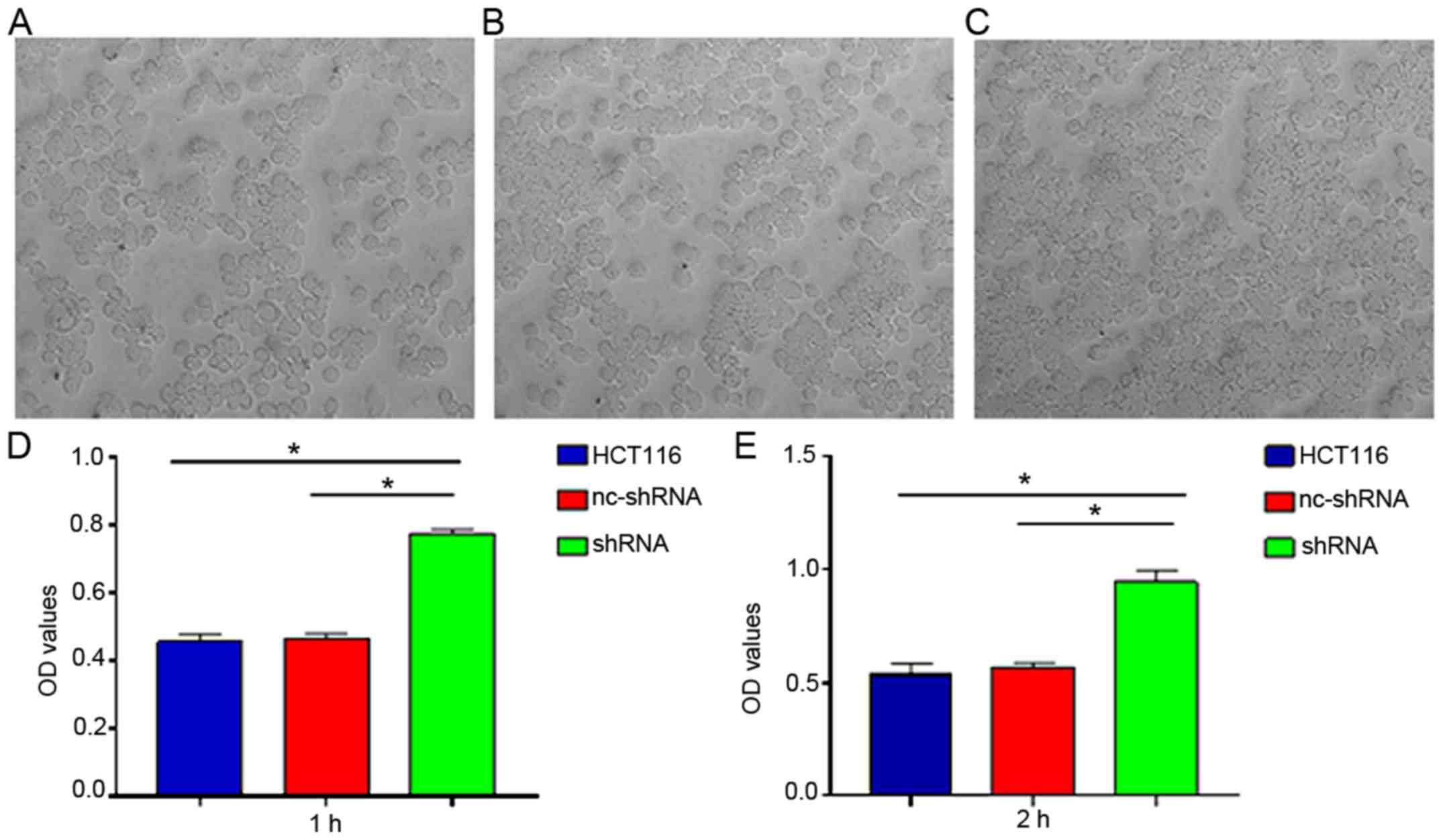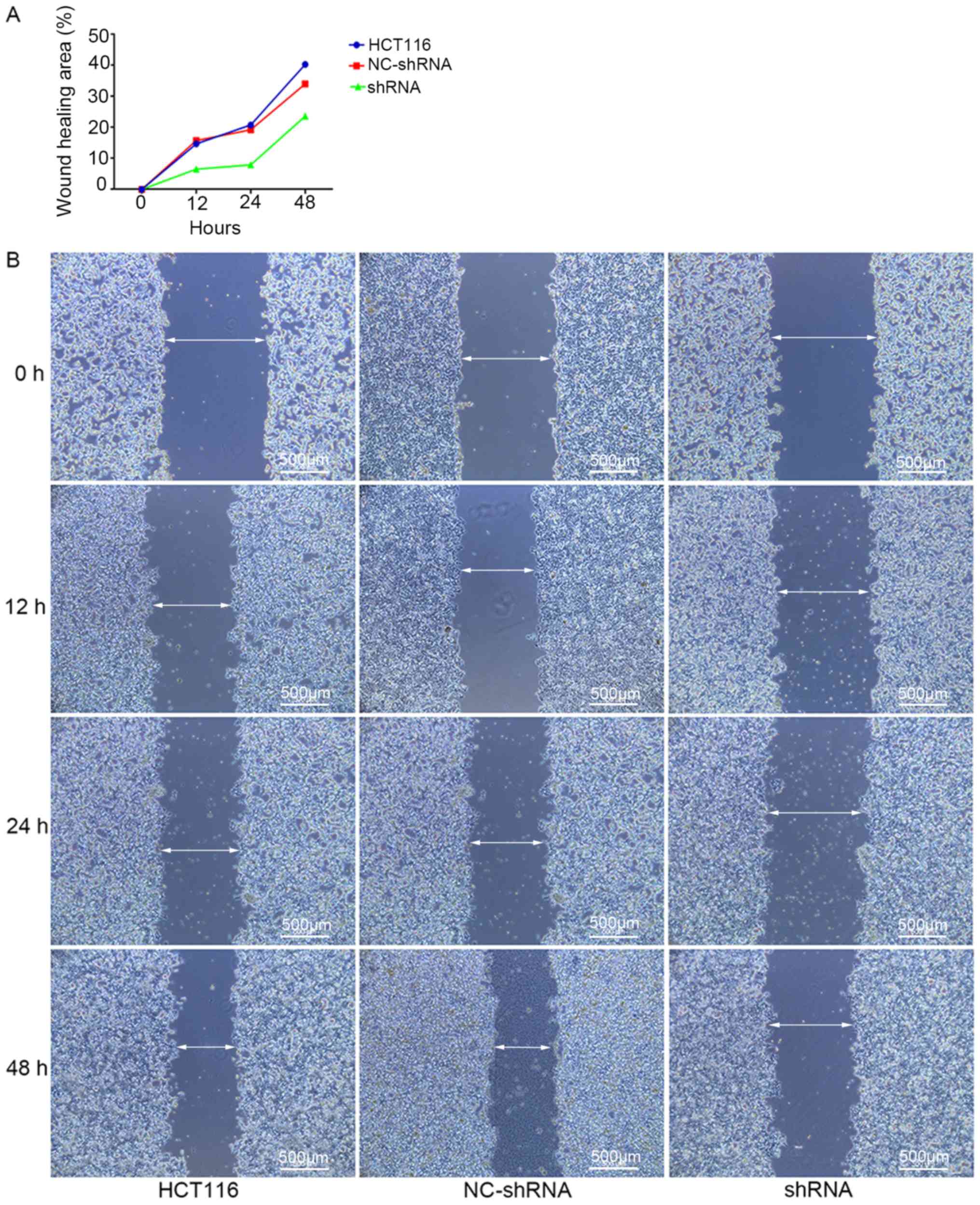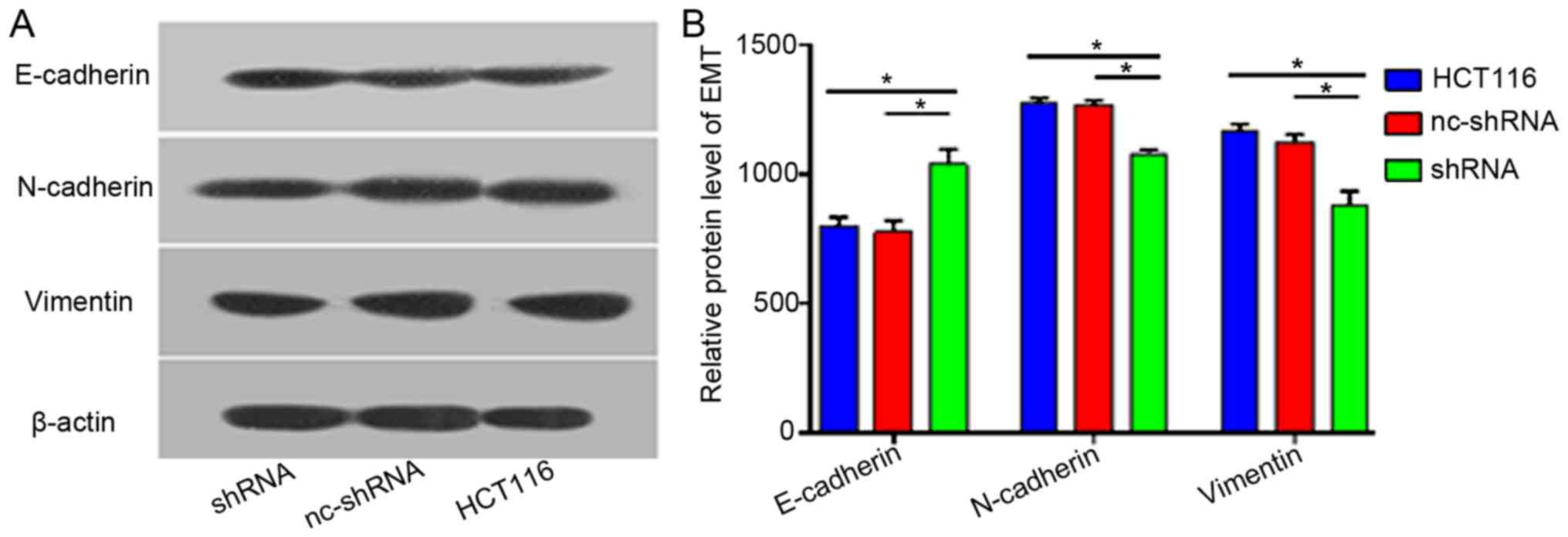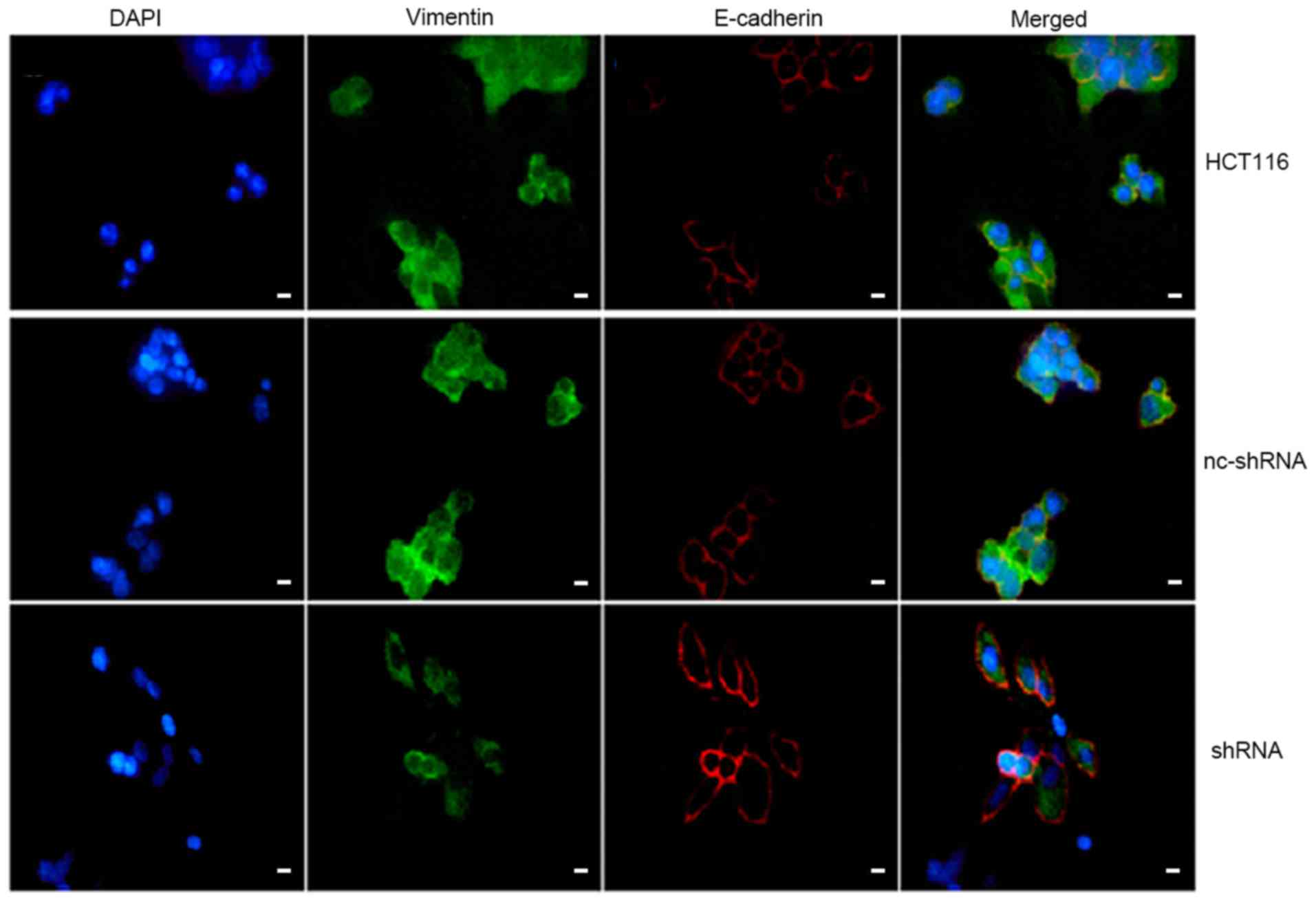|
1
|
Torre LA, Bray F, Siegel RL, Ferlay J,
Lortet-Tieulent J and Jemal A: Global cancer statistics, 2012. CA
Cancer J Clin. 65:87–108. 2015. View Article : Google Scholar : PubMed/NCBI
|
|
2
|
Sung JJ, Lau JY, Goh KL and Leung WK; Asia
Pacific Working Group on Colorectal Cancer, : Increasing incidence
of colorectal cancer in Asia: Implications for screening. Lancet
Oncol. 6:871–876. 2005. View Article : Google Scholar : PubMed/NCBI
|
|
3
|
Dawson H and Lugli A: Molecular and
pathogenetic aspects of tumor budding in colorectal cancer. Front
Med (Lausanne). 2:112015.PubMed/NCBI
|
|
4
|
Roskoski R: The ErbB/HER family of
protein-tyrosine kinases and cancer. Pharmacol Res. 79:34–74. 2014.
View Article : Google Scholar : PubMed/NCBI
|
|
5
|
Rego RL, Foster NR, Smyrk TC, Le M,
O'Connell MJ, Sargent DJ, Windschitl H and Sinicrope FA: Prognostic
effect of activated EGFR expression in human colon carcinomas:
Comparison with EGFR status. Br J Cancer. 102:165–172. 2010.
View Article : Google Scholar : PubMed/NCBI
|
|
6
|
Kapitanović S, Radosević S, Kapitanović M,
Andelinović S, Ferencić Z, Tavassoli M, Primorać D, Sonicki Z,
Spaventi S, Pavelic K and Spaventi R: The expression of
p185(HER-2/neu) correlates with the stage of disease and survival
in colorectal cancer. Gastroenterology. 112:1103–1113. 1997.
View Article : Google Scholar : PubMed/NCBI
|
|
7
|
Mitsui K, Yonezawa M, Tatsuguchi A, Shinji
S, Gudis K, Tanaka S, Fujimori S and Sakamoto C: Localization of
phosphorylated ErbB1-4 and heregulin in colorectal cancer. BMC
Cancer. 14:8632014. View Article : Google Scholar : PubMed/NCBI
|
|
8
|
Machleidt A, Buchholz S, Diermeier-Daucher
S, Zeman F, Ortmann O and Brockhoff G: The prognostic value of Her4
receptor isoform expression in triple-negative and Her2 positive
breast cancer patients. BMC Cancer. 13:4372013. View Article : Google Scholar : PubMed/NCBI
|
|
9
|
Göthlin EA, Tina E, Wegman P, Stål O,
Fransén K, Fornander T and Wingren S: HER4 tumor expression in
breast cancer patients randomized to treatment with or without
tamoxifen. Int J Oncol. 47:1311–1120. 2015. View Article : Google Scholar : PubMed/NCBI
|
|
10
|
Nielsen TO, Poulsen SS, Journe F, Ghanem G
and Sorensen BS: HER4 and its cytoplasmic isoforms are associated
with progression-free survival of malignant melanoma. Melanoma Res.
24:88–91. 2014. View Article : Google Scholar : PubMed/NCBI
|
|
11
|
Wang H, Sun W, Sun M, Fu Z, Zhou C, Wang
C, Zuo D, Zhou Z, Wang G, Zhang T, et al: HER4 promotes cell
survival and chemoresistance in osteosarcoma via interaction with
NDRG1. Biochim Biophys Acta Mol Basis Dis. 1864:1839–1849. 2018.
View Article : Google Scholar : PubMed/NCBI
|
|
12
|
Guo Y, Duan Z, Jia Y, Ren C, Lv J, Guo P,
Zhao W, Wang B, Zhang S, Li Y and Li Z: HER4 isoform CYT2 and its
ligand NRG1III are expressed at high levels in human colorectal
cancer. Oncol Lett. 15:6629–6635. 2018.PubMed/NCBI
|
|
13
|
Thiery JP and Sleeman JP: Complex networks
orchestrate epithelial-mesenchymal transitions. Nat Rev Mol Cell
Biol. 7:131–142. 2006. View
Article : Google Scholar : PubMed/NCBI
|
|
14
|
Savagner P, Boyer B, Valles AM, Jouanneau
J and Thiery JP: Modulations of the epithelial phenotype during
embryogenesis and cancer progression. Cancer Treat Res. 71:229–249.
1994. View Article : Google Scholar : PubMed/NCBI
|
|
15
|
Tam WL and Weinberg RA: The epigenetics of
epithelial-mesenchymal plasticity in cancer. Nat Med. 19:1438–1449.
2013. View
Article : Google Scholar : PubMed/NCBI
|
|
16
|
Vu T and Datta PK: Regulation of EMT in
colorectal cancer: A culprit in metastasis. Cancers (Basel).
9(pii): E1712017. View Article : Google Scholar : PubMed/NCBI
|
|
17
|
Jacobs TW, Gown AM, Yaziji H, Barnes MJ
and Schnitt SJ: Specificity of HercepTest in determining HER-2/neu
status of breast cancers using the United States Food and Drug
Administration-approved scoring system. J Clin Oncol. 17:1983–1987.
1999. View Article : Google Scholar : PubMed/NCBI
|
|
18
|
Williams CS, Bernard JK, Demory Beckler M,
Almohazey D, Washington MK, Smith JJ and Frey MR: ERBB4 is
over-expressed in human colon cancer and enhances cellular
transformation. Carcinogenesis. 36:710–718. 2015. View Article : Google Scholar : PubMed/NCBI
|
|
19
|
Huang KK, Ramnarayanan K, Zhu F,
Srivastava S, Xu C, Tan ALK, Lee M, Tay S, Das K, Xing M, et al:
Genomic and epigenomic profiling of high-risk intestinal metaplasia
reveals molecular determinants of progression to gastric cancer.
Cancer Cell. 33:137–150.e5. 2018. View Article : Google Scholar : PubMed/NCBI
|
|
20
|
Tiwari A, Mukherjee B, Hassan MK,
Pattanaik N, Jaiswal AM and Dixit M: Reduced FRG1 expression
promotes prostate cancer progression and affects prostate cancer
cell migration and invasion. BMC Cancer. 19:3462019. View Article : Google Scholar : PubMed/NCBI
|
|
21
|
Ljuslinder I, Malmer B,
Isaksson-Mettävainio M, Oberg A, Henriksson R, Stenling R and
Palmqvist R: ErbB 1–4 expression alterations in primary colorectal
cancers and their corresponding metastases. Anticancer Res.
29:1489–1494. 2009.PubMed/NCBI
|
|
22
|
Baiocchi G, Lopes A, Coudry RA, Rossi BM,
Soares FA, Aguiar S, Guimarães GC, Ferreira FO and Nakagawa WT:
ErbB family immunohistochemical expression in colorectal cancer
patients with higher risk of recurrence after radical surgery. Int
J Colorectal Dis. 24:1059–1068. 2009. View Article : Google Scholar : PubMed/NCBI
|
|
23
|
Kountourakis P, Pavlakis K, Psyrri A,
Rontogianni D, Xiros N, Patsouris E, Pectasides D and Economopoulos
T: Prognostic significance of HER3 and HER4 protein expression in
colorectal adenocarcinomas. BMC Cancer. 6:462006. View Article : Google Scholar : PubMed/NCBI
|
|
24
|
Huang F, Shi Q, Li Y, Xu L, Xu C, Chen F,
Wang H, Liao H, Chang Z, Liu F, et al: HER2/EGFR-AKT signaling
switches TGF-β from inhibiting cell proliferation to promoting cell
migration in breast cancer. Cancer Res. 78:6073–6085. 2018.
View Article : Google Scholar : PubMed/NCBI
|
|
25
|
Siddiqa A, Long LM, Li L, Marciniak RA and
Kazhdan I: Expression of HER-2 in MCF-7 breast cancer cells
modulates anti-apoptotic proteins Survivin and Bcl-2 via the
extracellular signal-related kinase (ERK) and phosphoinositide-3
kinase (PI3K) signalling pathways. BMC Cancer. 8:1292008.
View Article : Google Scholar : PubMed/NCBI
|
|
26
|
Béguelin W, Díaz Flaqué MC, Proietti CJ,
Cayrol F, Rivas MA, Tkach M, Rosemblit C, Tocci JM, Charreau EH,
Schillaci R and Elizalde PV: Progesterone receptor induces ErbB-2
nuclear translocation to promote breast cancer growth via a novel
transcriptional effect: ErbB-2 function as a coactivator of Stat3.
Mol Cell Biol. 30:5456–5472. 2010. View Article : Google Scholar : PubMed/NCBI
|
|
27
|
Lo HW: Targeting Ras-RAF-ERK and its
interactive pathways as a novel therapy for malignant gliomas. Curr
Cancer Drug Targets. 10:840–848. 2010. View Article : Google Scholar : PubMed/NCBI
|
|
28
|
Lee JC, Wang ST, Chow NH and Yang HB:
Investigation of the prognostic value of coexpressed erbB family
members for the survival of colorectal cancer patients after
curative surgery. Eur J Cancer. 38:1065–1071. 2002. View Article : Google Scholar : PubMed/NCBI
|
|
29
|
Donoghue JF, Kerr LT, Alexander NW,
Greenall SA, Longano AB, Gottardo NG, Wang R, Tabar V, Adams TE,
Mischel PS and Johns TG: Activation of ERBB4 in glioblastoma can
contribute to increased tumorigenicity and influence therapeutic
response. Cancers (Basel). 10(pii): E2432018. View Article : Google Scholar : PubMed/NCBI
|
|
30
|
Shi J, Li F, Yao X, Mou T, Xu Z, Han Z,
Chen S, Li W, Yu J, Qi X, et al: The HER4-YAP1 axis promotes
trastuzumab resistance in HER2-positive gastric cancer by inducing
epithelial and mesenchymal transition. Oncogene. 37:3022–3038.
2018. View Article : Google Scholar : PubMed/NCBI
|
|
31
|
Wang W, Zhao HF, Yao TF and Gong H:
Advanced development of ErbB family-targeted therapies in
osteosarcoma treatment. Invest New Drugs. 37:175–183. 2019.
View Article : Google Scholar : PubMed/NCBI
|
|
32
|
Yun S, Kwak Y, Nam SK, Seo AN, Oh HK, Kim
DW, Kang SB and Lee HS: Ligand-independent epidermal growth factor
receptor overexpression correlates with poor prognosis in
colorectal cancer. Cancer Res Treat. 50:1351–1361. 2018. View Article : Google Scholar : PubMed/NCBI
|
|
33
|
De Craene B and Berx G: Regulatory
networks defining EMT during cancer initiation and progression. Nat
Rev Cancer. 13:97–110. 2013. View Article : Google Scholar : PubMed/NCBI
|
|
34
|
Sulaiman A, Li L and Wang L: E-cadherin
adhesion-mediated Wnt activation for mesoderm specification in
human embryonic stem cells needs a soft mattress. Stem Cell
Investig. 3:772016. View Article : Google Scholar : PubMed/NCBI
|
|
35
|
Song G, Zhang H, Chen C, Gong L, Chen B,
Zhao S, Shi J, Xu J and Ye Z: MiR-551b regulates
epithelial-mesenchymal transition and metastasis of gastric cancer
by inhibiting ERBB4 expression. Oncotarget. 8:45725–45735.
2017.PubMed/NCBI
|
|
36
|
Chen T, Zhou L, Li H, Tian Y, Li J, Dong
L, Zhao Y and Wei D: Fatty acid synthase affects expression of ErbB
receptors in epithelial to mesenchymal transition of breast cancer
cells and invasive ductal carcinoma. Oncol Lett. 14:5934–5946.
2017.PubMed/NCBI
|















